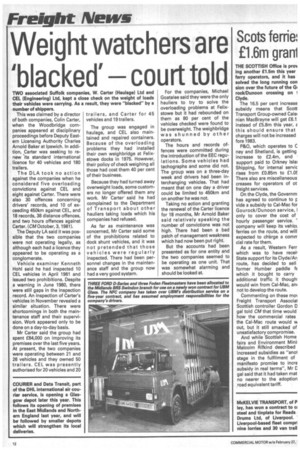'blacked' court told
Page 8

If you've noticed an error in this article please click here to report it so we can fix it.
TWO associated Suffolk companies, W. Carter (Haulage) Ltd and CEL (Engineering) Ltd, kept a close check on the weight of loads their vehicles were carrying. As a result, they were "blacked" by a number of shippers.
This was claimed by a director of both companies, Colin Carter, when the Woodbridge companies appeared at disciplinary proceedings before Deputy Eastern Licensing Authority Charles Arnold Baker at Ipswich. In addition, ,Carter was seeking to renew its standard international licence for 40 vehicles and 180 trailers.
The DLA took no action against the companies when he considered five overloading convictions against CEL and eight against Carter. There were also 30 offences concerning drivers' records, and 10 of exceeding 450km against CEL, and 18 records, 38 distance offences, and two hours offences against Carter. (CM October, 3, 1981).
The Deputy LA said it was possible that the two companies were not operating legally, as although each had a licence they appeared to be operating as a conglomerate.
Vehicle examiner Kenneth Hohl said he had inspected 10 CEL vehicles in April 1981 and issued two prohibitions. Despite a warning in June 1980, there were still gaps in the inspection record. An inspection of Carter's vehicles in November revealed a similar situation. There were shortcomings in both the maintenance staff and their supervision. Work appeared only to be done on a day-to-day basis.
Mr Carter said the group had spent £84,000 on improving its premises over the last five years. At present, the two companies were operating between 21 and 26 vehicles and they owned 50 trailers. CEL was presently authorised for 20 vehicles and 20 trailers, and Carter for 45 vehicles and 19 trailers.
The group was engaged in haulage, and CEL also maintained and repaired containers. Because of the overloading problems they had installed their own weighbridge at Felixstowe docks in 1975. However, their policy of check weighing all those had cost them 40 per cent of their business.
Because they had turned away overweight loads, some customers no longer offered them any work. Mr Carter said he had complained to the Department of Transport about other hauliers taking loads which his companies had refused.
As far as maintenance was concerned, Mr Carter said some of the prohibitions related to dock shunt vehicles, and it was not pretended that those vehicles were regularly inspected. There had been personnel changes in the maintenance staff and the group now had a very good system. For the companies, Michael Goatalee said they were the only hauliers to try to solve the overloading problems at Felixstowe but it had rebounded on them as 80 per cent of the vehicles checked were found to be overweight. The weighbridge was shunned by other operators.
The hours and records offences were committed during the introduction of the EEC regulations. Some vehicles had tachographs and some did not. The group was on a three-day week and drivers had been interchanging vehicles. That had meant that on one day a driver could be limited to 450km and on another he was not.
Taking no action and granting the renewal of the Carter licence for 18 months, Mr Arnold Baker said relatively speaking the number of convictions was not high. There had been a bad patch of management weakness which had now been put right.
But the accounts had been presented as for one entity and the two companies seemed to be operating as one unit. That was somewhat alarming and should be looked at.


















































